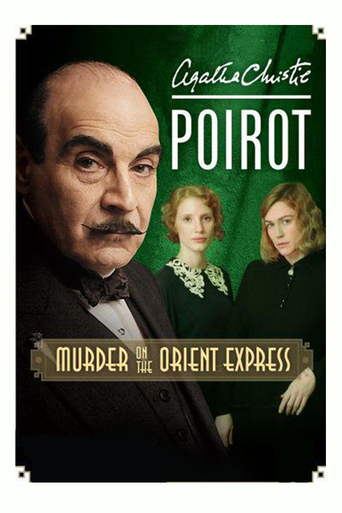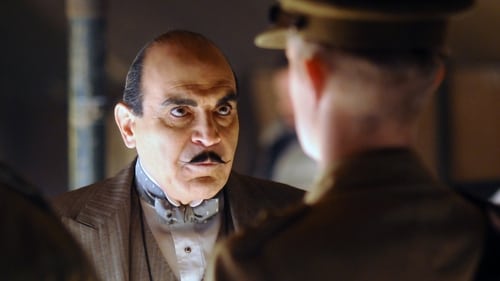


What a waste of my time!!!
... View MoreVery well executed
... View MoreA Disappointing Continuation
... View MoreI wanted to like it more than I actually did... But much of the humor totally escaped me and I walked out only mildly impressed.
... View MoreConsidering how old the tale is, this is a perfect example of the genius of Agatha Christie. But I will be very quick to add that with the casting can make or break such a gem. And this version is very well played. Poirot(Suchet) has now earned his reputation as a great actor and it allows the viewer to really enjoy the tale. So about the tale...without giving away too much, I will say that this movie is worth the watch...every bit of it. Enjoy.
... View MoreThe film gets marvelous interpretations , lush costume design and adequate production design along with glimmer photography . The movie is an excellent whodunit and this version of the story takes place in 1938 , concerning about one murder on the Orient Express train with Hercules Poirot , David Suchet , as the intelligent sleuth-man to solve it . There Hercule meets various passengers and Ratchett , Toby Jones , an American executive , traveling with his valet and male secretary , and he attempts to secure Poirot's services as he fears that his life is in danger . When the murder of the abrasive American businessman occurs on the train he's travelling on , celebrated detective Hercule Poirot is then recruited to solve the case . Shortly after , the Orient Express is blocked by a blizzard in Croatia . There are many suspects , all support cast : David Morrissey , Susanne Lothar ,Barbara Hershey , Hugh Bonneville , Steven Weaver , Jessica Chastain ... As usual , the final scenes, Poirot shares his solution of the case. In the picture there is mystery , emotion , suspense , twists , actors's interpretations are wonderful and including snowy outdoors . At the beginning of the film talks about a kidnapping and killing a baby similarly to the Lindberg's son and which the murderer was condemned to death row , this one will be related with the death of the train . In fact , Agatha Christie's story , being published in 1934 , was inspired by the notorious kidnapping, and subsequent murder, of famous aviator Charles A. Lindbergh and Anne Morrow Lindbergh's baby, Charles Lindbergh Jr. in 1932 . The pace is deliberate , slow and relaxed . And while the dialogue is in English, the film has a deliciously international flavor , with a mix of interesting accents and word pronunciations . The motion picture is only set on two scenarios : the station and train . However this doesn't make boring it . The support cast is pretty good , formed mostly by British and American actors , such as : Jessica Chastian , David Morrissey , Toby Jones , Stanley Wever , Samuel West , Joseph Mawle , Serge Hazanavicious , Marie-Josée Croze and special mention for Eileen Atkins as the veteran as well as bittered Princess Dragomiroff and Hugh Bonneville who portrays a trusted valet of a wealthy gentleman . The set design and costumes are riveting , the flick is magnificently set by that time . Evocative and suspenseful musical score by Christian Henson . Alan Almond's cinematography is atmospheric and colorful ; being shot at Pinewood Studios in Buckinghamshire, where the design team built a believable replica of an Orient Express carriage . This Hercule Poirot episode was efficiently directed by Philip Martin .The TV movie will appeal to suspense enthusiasts and thriller lovers. There are several adaptation based on this known novel by Agatha Christie : Murder on the Orient Express (2001) by Carl Schenkel with Alfred Molina as Hercule Poirot , Meredith Baxter , Leslie Caron , Adam James , Dylan Smith , Tasha de Vasconcelos , Amira Casar and Peter Strauss . And the outstanding rendition was Murder on the Orient Express (1974) by Sidney Lumet Sean Connery , Anthony Perkins , Vanessa Redgrave , Jacqueline Bisset , Richard Widmark , Rachel Roberts , John Gielgud , Michael York and Ingrid Bergman's Oscar-winning performance . And finally Murder on the Orient Express (2017) starred and directed by Kenneth Branagh with Johnny Depp , Josh Gad , Derek Jacobi , Adam Garcia , Judi Dench , Penelope Cruz , Olivia Colman and Daisy Riley .
... View MoreIn the Agatha Christie books, Poirot starts off as a middle aged detective trying to makes his way as a private investigator and ends up being famous and wealthy, also living to a very old age.The Poirot television series has remained stuck in the 1930s but I could not help noticing how old David Suchet looks here compared to the first series which started back in 1989.Not only is the actor looking older, he seems to have had a personality change. Gone is the quirky humour and sidekicks such as Hastings and Inspector Japp. This Poirot is embittered and angry as well as developing deep religious convictions.Despite the feature length running time and a relatively all star cast, this has a young Jessica Chastain in it. I also noted that the detailed sets and art direction that the earlier series had is absent here. Yes the Orient Express is recreated, there is overseas location feeling but it lacks art deco sumptuousness.Murder in the Orient Express has been adapted before, the most famous being the Albert Finney version directed by Sidney Lumet.Poirot after an assignment in Palestine boards the Orient Express after encountering his friend who owns the line and is asked to investigate the murder of a dubious American business tycoon aboard. The other passengers who are from far and wide seemed to be all connected to each other in some way and had a grudge against the victim.A disappointing film given that there is a famous all star movie version about. In some ways it felt rushed as the characters did not feel sketched out.
... View MoreI have read through many of the reviews on here, it's fair to say on first viewing, which I think was Christmas time a few years ago, I didn't like it, too much of a fan of the Albert Finney fan, but on the second viewing I'll be honest I fell in love with it. I can imagine when they were in the pre-production stages they came up with the 'dark' theme, it's such a contrast to the movie. Toby Jones is brilliant in the role of villain, he plays his scenes with such venom, a great actor, totally loathsome. I think I originally found the stoning scene a little distasteful during Christmas TV, but it's there to set the tone. David Suchet is on his A game here and gives a masterclass to the rest of the cast, he is outstanding. You get a true sense of claustrophobia on the train when they are marooned, and the obvious cold they would have encountered is definitely evident. Poirot's summing up seems more as to what I would have believed in with Poirot, a sense of injustice. The closing scene had me in tears on the second viewing, it is truly brilliant.This version is also superior to the 2017 remake, and although Kenneth Branagh was excellent as Poirot, David Suchet will always be Christie's famous character.
... View More